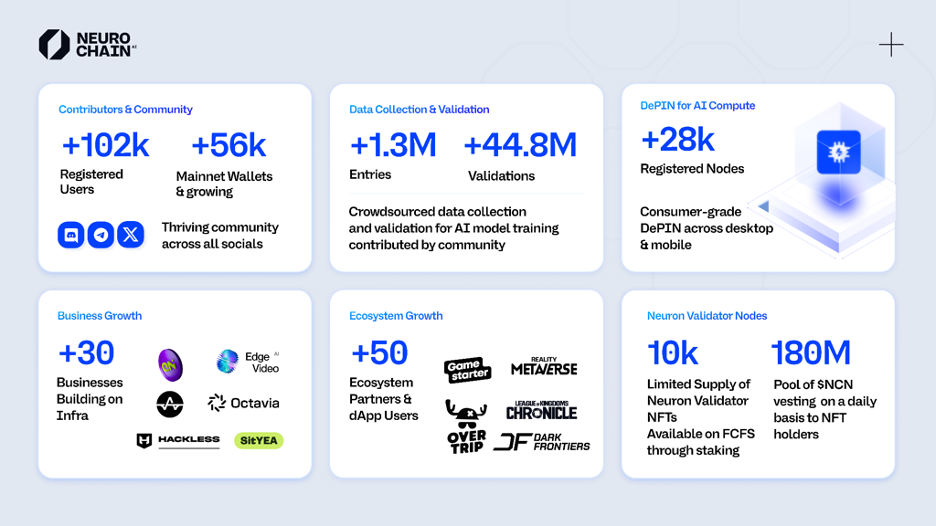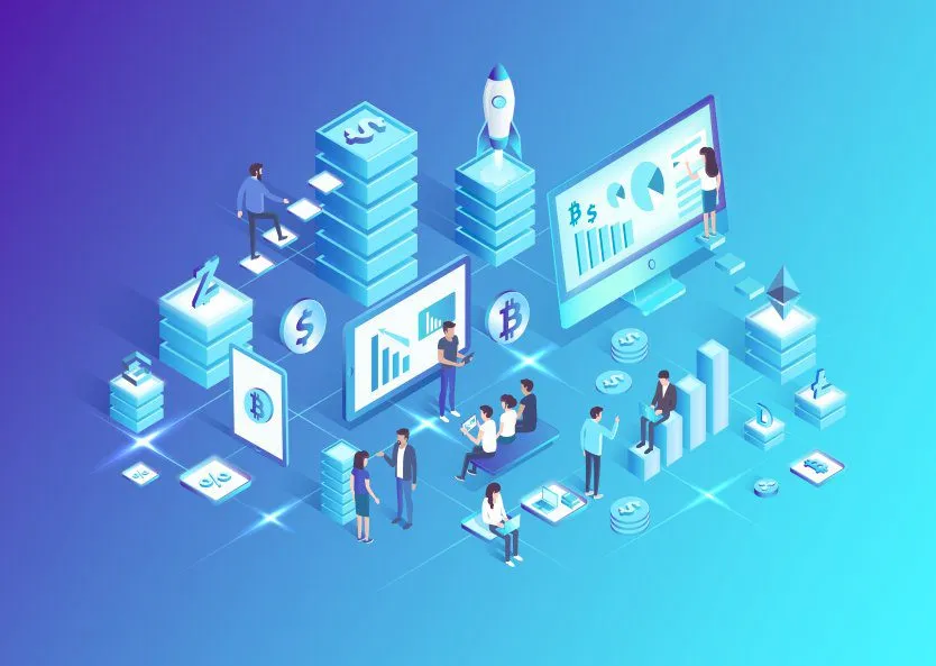This year has seen the explosive growth of the decentralized AI industry with massive developments and investments made in the “Crypto + AI” field. One such platform, NeurochainAI, a decentralized AI as a service (DeAIAAS) platform, has been ramping up community support ahead of its planned token generation event (TGE), but what exactly does the platform offer and what solutions does the DeAIAAS platform aim to solve?
Crypto and blockchain technology were always going to be integrated into artificial intelligence (AI), just as the technology has done in almost all major industries. It was a question of when rather than if. In 2024, decentralized AI has become the hottest topic in the Web 3 space, with hundreds (and probably thousands) of DeAI and DePIN (decentralized physical infrastructure networks) projects launching. Top Web 3 conferences rarely lack a speaker talking about the subject and crypto + AI projects are booming.
The DeAI and DePIN industry has flourished in the past year with the market capitalization reaching a remarkable $50 billion – and is expected to grow further in the coming years.
So why is the industry growing at such a rapid pace and why does it matter?
Simply, it is all about democratizing the AI space from the centralization effects of Big Tech companies. In a similar breath to Bitcoin and decentralized finance (DeFi), which countered the problems of centralized financial institutions that acted badly and jeopardized people’s money, DeAI aims to solve the current centralized nature of AI models.
With artificial intelligence continuing to shape the crucial aspects of our lives, how we interact with the world, how we see it and how we work, the building of these technologies should be protected from centralization and the influence of Big Tech firms. However, the high costs of hardware and monopolization of these resources by mega-rich companies means many individuals and businesses are effectively barred from contributing to the advancement of AI.
Hence the creation of NeurochainAI, which aims to provide solutions to the current challenges the AI industry is facing through its DeAl Infrastructure, powered by the community and built for everyone.
DePIN & DeAI: Democratizing and Decentralizing The AI Industry
The global AI industry has witnessed massive growth in the past few years – both in the adoption of the technology and the overall revenue and impact on global industries. ChatGPT witnessed remarkable adoption rates, with over 1 million users joining the platform in the first five days of its release. Experts predict that the industry will grow at a remarkable 37% CAGR to $1.8 trillion by 2030.
It is evident that the world will be powered by AI given the massive benefits the technology offers. Some of the benefits include optimizing current systems’ inefficiencies, offering revolutionary solutions, saving costs, minimizing mistakes, optimizing processes, and solving some of the most complex problems across major industries.
Nonetheless, the challenges presented above could be a bottleneck to the growth and innovation of AI, as big tech companies monopolize the market.
The NeurochainAI ecosystem aims to break down the barriers of centralization and monopolization by encouraging cooperation and coordination among various AI stakeholders, including the general public and the developer community. By fostering an environment that rewards community, motivates contribution, and enables seamless integration with businesses, NeurochainAI sets the stage for a community-driven, decentralized AI revolution.
Driving the ecosystem is the $NCN token, which is set to launch in a token generation event (TGE) in the coming days. The project will embrace a fair launch approach to ensure all community members have an equal chance to buy the token. There is no pre-mining, no early access or IDOs for the token rather, the token will launch on centralized exchanges, making it available for everyone to buy.
The $NCN token is used on the platform as a main currency for processing transactions, covering gas and incentives for using the platform, building and deploying smart contracts and dApps, as well as running applications. While not confirmed by the official team, a total cap of 3 billion $NCN tokens will be made available, with 40% of the total supply reserved for the ecosystem and 20% allocated solely to the development and growth of the project.
The Neuron Validator Node Network
Following the token launch, NeurochainAI will also start node staking – not a node sale but a transparent and community-driven model for validator node network growth. Similar to Ethereum’s proof-of-stake model, holders of $NCN tokens need to stake their coins to become a validator.
According to its website, NeurochainAI validators contribute to the decentralization of the NeurochainAI ecosystem and earn rewards for network participants. Neuron Validator NFT holders (early node operators) receive daily compensation for their early participation in the NeurochainAI ecosystem.

To hold a Neuron Validator NFT, users have to stake at least 12,000 $NCN tokens at the TGE. Neuron Node NFTs are distributed via smart contract immediately after staking. The number of NFTs will be limited – only 10,000 NFTs. Users who participate in the node staking have to transfer $NCNs to their wallet which is going to be used for validation. They will also need to stake the coins in the smart contract available on NeurochainAI network. Node stakers will receive an NFT key. NFTs will be used to identify Neuron Nodes as lite validators on the network and kick in the rewarding process. Participants can subscribe for updates on the node staking here.
Crucially, the launch of the TGE event will allow users to buy $NCN tokens freely, but only 3,000 to 4,000 NFTs may be available upon launch. With supply limited and demand for NFTs expected to rise following the TGE, this may push an upward pressure on the price of $NCN tokens and a sustainable and significant price growth in the future.
The Prospects of Growth For The Decentralized AI Market
Decentralized AI has the potential to revolutionize global industries in similar ways as the internet, computers and social media did in the past few decades. From healthcare to financial services, gaming, supply chain management, robotics, and even the metaverse.
While still at its infancy, decentralized AI has the potential to move from only infrastructure-intensive innovations to Generalized AI (AGI), competing with the big tech firms such as Open AI (ChatGPT) and X (Grok) of the world. Only time will tell.
This news is republished from another source. You can check the original article here







